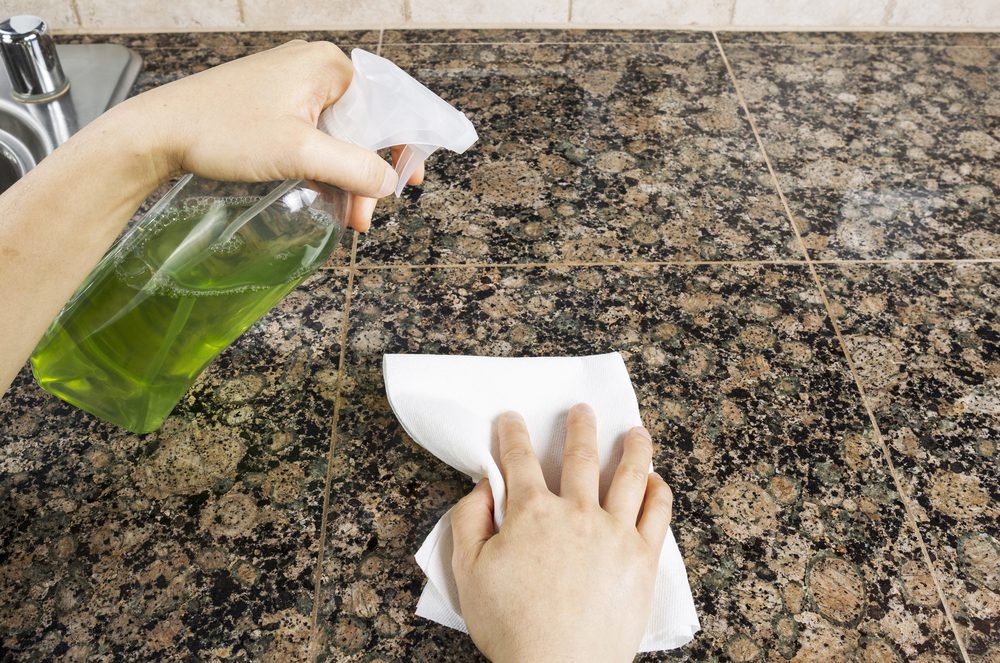One of the main duties of household cleaners is to clean and maintain the tiles and grout regularly. We recommend that tiles should be hoovered or swept whenever you notice any debris. You can hoover all types of tiles with a soft brush attachment. However, you should clean the side of the walls and corners using a broom and dustpan. You should mop the tiles once every 1 or 2 weeks or when they become dirty. Otherwise if neglected, the dirt and grime will build up quickly on the tiles, which will have a layer of hazy coating on them and the grout can be damaged and discoloured.
Household cleaners – How to clean different types of tiles
The tiles are not very difficult to clean, as most of the types of tiles do not absorb liquids. However, there are different cleaning methods and products need to be used for more delicate types of tiles.
Ceramic and porcelain tiles:
Ceramic and porcelain tile floors are very easy to look after, as they have very durable surface. There are some steps to follow:
- Remove loose dirt from the surface. It is important to regularly hoover or sweep the surface to clean up the debris. Therefore, they will not become dull over time.
- Mop it up. Use clean water and mild detergent when mopping the floor up. Do not use a lot of water when cleaning the tiles and change the water if it becomes dirty. Excess and dirty water can discolour the grout and making the tiles dull. Also, avoid using sponge mops on tiles, as they drive the dirty water into the grout lines.
- Dry it up. Once you finished mopping up the tile floor, make sure you dry it up with a clean microfibre cloth immediately. Therefore, your floor will be shiny clean without any water streaks. Do not bend when drying up the floor, instead step on the cloth and move it with your feet.
- Remove soap residue. There might be some soap residue left on the surface, if your tile floor still looks dull after cleaning. Clean it up by using mild all-purpose detergent. You can also use fresh lemon juice to remove soap residue on only ceramic or porcelain. However, must not clean stone tiles with lemon juice, as it could damage them.
- Stain removal. If you find stains on the floor, you need to examine what material caused the discolouration. Once identified the substance causing the stain, you can remove it using the appropriate cleaning detergent.
Stone tiles (slate, marble or granite):
Household cleaners need to take extra special care when cleaning porous stone tiles like slate, marble or granite.
- Use only soft microfibre cloth when cleaning them. Do not clean natural stones with anything which can scratch them. Including brushes with strong bristles, sponge scourers or cleaning powders.
- Avoid using acidic and abrasive chemicals like bleach, limescale removers, vinegar, lemon, etc.. could cause permanent damage to them. You need use special cleaning solutions made for natural stones when cleaning them.
- Dry the surface up immediately with a dry microfibre cloth using circular motions, once you cleaned the natural stone. Drying up straight after cleaning will make the surface shiny and gleaming. Otherwise, water streaks can form, and the surface could become dull.
You can read more on how professional household cleaners clean and maintain granite and marble surfaces by clicking on these links directing our previous blogs.
Resilient tile floors (Vinyl, linoleum, cork)
It is the easiest to clean and maintain tiles made of vinyl, linoleum or cork as they are very resilient and long-lasting. However, avoid using steam mops on these types of tiles as the extreme heat and moisture could damage them.
Here are some guidelines when cleaning the different types of resilient types:
- Vinyl tile: You need to regularly sweep or hoover to remove debris. Once the dirt is removed, use vinegar or other cleaning solutions suitable for vinyl to clean it. You must not use any abrasive chemicals or any scrubbing cleaning equipment when cleaning, as it would damage the surface.
- Linoleum tile: Despite linoleum looks very similar to vinyl tiles, it needs to be cleaned differently. You need to use linoleum cleaning solutions such as borax and water. Every 3 or 6 month, apply a coating of wax to make it shiny and prevent it from damage.
- Cork tile: If the surface is sealed, as it is enough to clean it with mild detergents or white vinegar. If it is unfinished or waxed, after the tile is dry, apply a layer of liquid or solid wax.
Additionally, for many more cleaning tips for tiles, you can read this article.
Why use Clean Natural Household Cleaners to clean your home?
- 5-Star Rated Eco-Friendly household cleaners services.
- Weekly / Fortnightly / Monthly / One-Off Cleaning Services.
- Experienced and Well-paid Professional Cleaners (£12/hour and above).
- Easy Online Payment.
- Dedicated Customer Service.
- Our Eco-friendly Cleaning Products Used for the 1st Cleaning.
- 1 Tree Planted After Every New Booking and Every 4th Cleaning Session Completed.
If you would need experienced household cleaners for regular domestic cleaning, please contact us today! Call us by phone on 020 86109695 or drop us an email at [email protected] to find out availability. Reserve your household cleaner online at our website today!
Sources:
https://www.goodhousekeeping.com/uk/house-and-home/household-advice/a674117/how-to-clean-grout/
https://www.wikihow.com/Clean-Bathroom-Tile
https://www.bhg.com/homekeeping/house-cleaning/tips/how-to-clean-tile-floors/
https://www.bhg.com/homekeeping/house-cleaning/surface/tile-stain-removal-guide/ – Tile stains
https://floorcritics.com/cleaning-linoleum-floors/
https://www.carpetright.co.uk/guides/care/vinyl-care-guide

Recent Comments